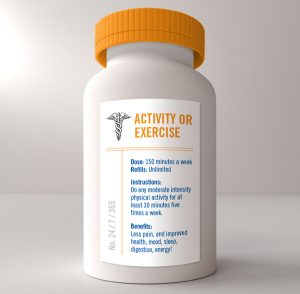
Cognitive Brain Health
Physical & Cognitive Health Program
Improving brain functioning through personalized physical exercise and targeted neurocognitive training programs.
Imagine if you went to visit your doctor and instead of prescribing a long list of medications with hefty side effects to help your brain health condition, you got a prescription for exercise. This is now becoming common practice in doctor’s offices all over the world.

Physical activity interventions are becoming a well-established non-pharmacological, non-invasive, affordable and low-risk option for the treatment and management of almost all late-life mood and cognitive disorders.
Did you know that going for a walk could actually help preserve your cognitive functioning as you age? A large body of evidence suggests that regular physical exercise can improve your thinking skills, specifically enhancing memory, attention, and executive functions in older adults and furthermore is associated with a 35–38% reduction in the risk of cognitive decline and dementia. Nearly one third of the Alzheimer’s disease (AD) cases are thought to be attributed to modifiable risk factors related to lifestyle habits, including physical activity and cognitive stimulation.
A Smarter Way To Exercise
Recent studies have shown that performing the same routine cardio exercises may not be enough to pump the breaks on age-related neurodegeneration. These studies provide important insights into the benefits of exercise in improving cognition with reulting structural modifications in the motor cortex. The changes that occur in the brain appear to be dependent on the kind of exercise being performed such as pure aerobic (i.e. walking, swimming, cycling) or more skilled-based, cognitively engaging exercise.
Aerobic exercise increases the density of blood capillaries (angiogenesis) and brings about the birth of new neurons (neurogenesis).
Skilled-based exercises increase neuronal sprouting and synaptogenesis, important for re-establishing brain circuits impaired in disease states and required for normal cognition.
Therefore exercise programs that implement physical training along with targeted neurocognitive skills training (rather than each alone) show greater promise in improving cognitive function in healthy older adults and furthermore in individuals with memory complaints, mild cognitive impairment and dementia.
Our personalized, precision medicine approach to physical and neurocognitive health
- We conduct a comprehensive physical fitness and neurocognitive assessments
- We conduct motivational and personality interviewing along with goal-setting to understand your behavioral preferences and design your personalized program.
Cognitive Training
Goals
- Practice memory and related processes to stimulate brain health
Methods
- Daily, structured, validated, online brain training ‘games’
Cautions
- Excessive computer use can lead to eye strain, fatigue, anxiety, and insomnia
Reasoning
- Use it or lose it
- Practice makes perfect
Resources
- Anti-aging games – free trial, then $13/month
- Dakim Brain Fitness
- Lumosity – $15/month
- Posit Science – free exercises or fee-for-service full access
References
Smith GE, Housen P, Yaffe K, Ruff R, Kennison RF, Mahncke HW and Zelinski EM. A cognitive training program based on principles of brain plasticity: results from the Improvement in Memory with Plasticity‐based Adaptive Cognitive Training (IMPACT) study. J Am Geriatr Soc. 2009; 57:594‐603.
Education
Goals
- Build ‘cognitive reserve’ to protect brain from functional decline with aging
Methods
- Adult extension classes
- Language or music classes
Reasoning
- Mentally stimulating educational experiences help build and maintain memory
- Low educational achievement is a modifiable risk for developing Alzheimer’s
Exercise
Goals
- Improve cardiovascular and musculoskeletal health while boosting brain health
Methods
- 30 minutes/day of moderate aerobic training > 5 days per week or
- 15 minutes/day of vigorous aerobic training > 5 days per week plus
- 2 days/week of strength training for all major muscle groups plus
- > 2 days/week of balance training for legs and core muscle groups
Reasoning
- Brisk walking > 1 mile a day increases hippocampal volume (a mood and memory area of the brain and lowers the probability of mild memory loss changing to Alzheimer’s.
Resources
Go4Life: National Institute on Aging Exercise Program
References
- Aguiar P, Monteiro L, Feres A, Gomes I and Melo A. Rivastigmine transdermal patch and physical exercises for Alzheimer’s disease: a randomized clinical trial. Curr Alzheimer Res. 2014; 11:532‐537.
- Smith JC, Nielson KA, Woodard JL, Seidenberg M, Durgerian S, Hazlett KE, Figueroa CM, Kandah CC, Kay CD, Matthews MA and Rao SM. Physical activity reduces hippocampal atrophy in elders at genetic risk for Alzheimer’s disease. Frontiers in aging neuroscience. 2014; 6:61.